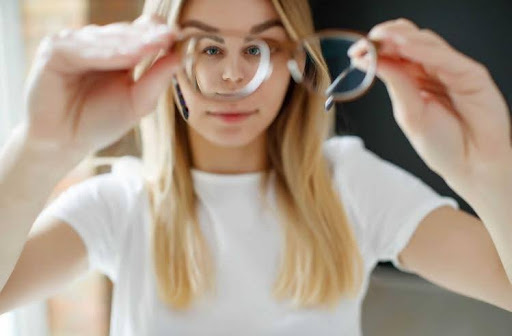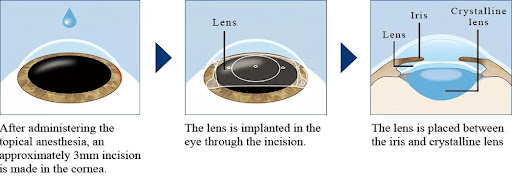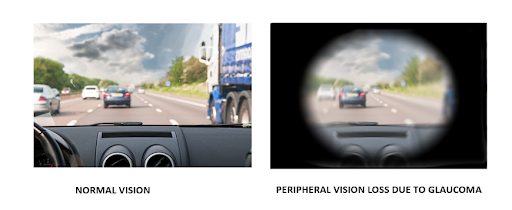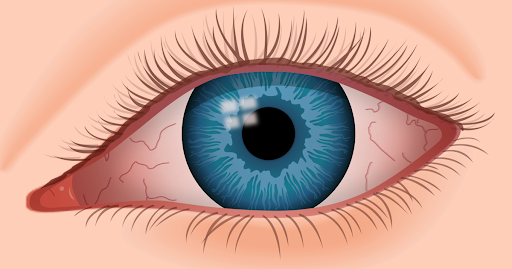Living with severe myopia poses unique challenges, but armed with understanding and practical strategies, individuals can lead fulfilling lives. Learn from experts at Eyeonce Eye Clinic with expert advice from two of South Korea’s renowned eye doctors, Dr. Paik Dong Won and Jung Sae Rom.
What is severe myopia?
Myopia occurs when the eyeball is too long or the cornea has excessive curvature. This causes light entering the eye to focus in front of the retina instead of directly on it. In severe myopia (high myopia), this eyeball elongation goes beyond the typical myopic condition, resulting in a more pronounced distortion of vision.
Critical Characteristics of Severe Myopia
- Profound Blurriness – Individuals with severe myopia experience significant blurriness when looking at objects in the distance, making activities like driving or recognizing faces challenging.
- Increased Risk of Eye Complications – The elongation of the eyeball in severe myopia raises the risk of eye complications such as retinal detachment, glaucoma, and macular degeneration.
- Progressive Nature – Unlike regular myopia, severe myopia often progresses more rapidly, requiring vigilant monitoring and proactive management.
Causes
Severe myopia, characterized by an exaggerated eyeball elongation, involves distinct causes and risks contributing to its advanced form of nearsightedness. Understanding these factors is crucial for effective management and proactive vision care.
- Genetics – One of the primary causes of severe myopia is genetic predisposition. If parents have high myopia, there is an increased likelihood that their children may develop severe myopia. Specific genetic factors influencing eye growth contribute to this hereditary aspect.
- Environmental Factors – Prolonged engagement in near-work activities, such as excessive reading or extended screen time, especially during childhood, may contribute to the development and progression of severe myopia. Lack of outdoor activities has been associated with a higher risk.
- Eye Structure Abnormalities – Individuals with abnormalities in the structure of the eye, such as thinner retina or more prominent eyes, are more prone to developing severe myopia.
Risks Associated with Severe Myopia
- Retinal Detachment – The elongation of the eyeball in severe myopia increases the risk of retinal detachment. This occurs when the retina, the thin layer at the back of the eye, pulls away from its normal position.
- Glaucoma – Severe myopia is linked to a higher risk of developing glaucoma, a condition characterized by increased pressure within the eye that can lead to optic nerve damage.
- Macular Degeneration – The risk of age-related macular degeneration (AMD) is elevated in individuals with severe myopia. AMD affects the central part of the retina, leading to vision impairment.
- Cataracts – While not a direct cause, severe myopia may increase the likelihood of developing cataracts, clouding the eye’s lens, as individuals age.
- Reduced Quality of Life – Beyond physical risks, severe myopia can impact an individual’s daily life, affecting academic and professional pursuits and necessitating visual adjustments.
Eyeonce Eye Clinic is a beacon of expertise; housing accomplished eye doctors dedicated to severe myopia management. Dr. Paik Dong Won and Dr. Jung Sae Rom, renowned for their commitment to eye health, provide personalized insights and advanced care for individuals with severe myopia.
Signs and Symptoms
Severe myopia manifests through distinct signs and symptoms that warrant an expert evaluation, such as:
- Blurry Vision – A prominent sign of severe myopia is persistent blurry vision, especially when attempting to focus on distant objects. Eyeonce Eye Clinic emphasizes the importance of promptly addressing vision changes.
- Eye Strain – Individuals with severe myopia often experience eye strain, particularly during activities that require extended visual concentration, such as reading or using digital devices.
- Headaches – Frequent headaches, particularly after engaging in tasks that demand visual focus, may indicate severe myopia. Eyeonce Eye Clinic recommends consulting professionals for persistent headaches.
- Squinting – Struggling to see clearly may lead to squinting, a subconscious effort to improve focus. Eyeonce conducts thorough examinations to identify underlying vision issues.
- Difficulty Seeing at Night – Severe myopia can exacerbate problems with night vision. Dr. Paik Dong Won and Dr. Jung Sae Rom explore these concerns, considering refractive errors and potential complications.
- Eye Fatigue – Extended periods of visual tasks may result in eye fatigue, impacting the overall well-being of individuals with severe myopia. Regular check-ups at Eyeonce Eye Clinic help manage and alleviate such symptoms.
If symptoms persist, consult a trusted eye center such as Eyeonce for immediate intervention.
Untreated Severe Myopia Complications
- When severe myopia goes untreated, individuals may face various complications that can significantly impact their vision and overall eye health, affecting everyday productivity.
- Untreated severe myopia often leads to a progressive decline in vision clarity. Distant objects become increasingly blurry, impacting daily activities such as driving or recognizing faces.
- Prolonged periods of uncorrected severe myopia can cause persistent eye strain, discomfort, and headaches.
- Without intervention, individuals may become increasingly reliant on stronger prescriptions for eyeglasses or contact lenses to compensate for their worsening vision.
The cumulative effects of untreated severe myopia can impact an individual’s overall well-being, influencing aspects such as social interactions and recreational activities.
Preventive Measures and Intervention
- Regular Eye Check-ups – Routine eye examinations are crucial in early detection and intervention. Individuals with severe myopia should undergo regular check-ups to monitor their vision and eye health changes.
- Corrective Measures – Eyeglasses or contact lenses prescribed by an eye care professional can help manage vision issues and alleviate discomfort associated with severe myopia.
- Consultation with Specialists – Seeking advice from specialists, such as those at Eyeonce Eye Clinic, ensures personalized care plans and timely interventions to mitigate the risks of untreated severe myopia.
Untreated severe myopia can lead to complications affecting both vision and eye health. Seeking professional guidance, regular check-ups, and intervention are essential to managing severe myopia effectively and preserving long-term visual well-being.
Why choose Eyeonce Eye Clinic Gangnam for severe myopia intervention?
Utmost Patient Care
Our eye care professionals and staff ensure to give you your money’s worth. We guarantee you receive the best medication possible and assure you that you are guided and understood, making you feel comfortable and confident at every step.
Comprehensive Consultation
Eyeonce Eye Clinic offers comprehensive eye examinations to evaluate your condition and determine the best eye strain treatment. Our ophthalmologists take their time to cater to your questions and address your concerns, ensuring you make an informed decision about our vision correction options.
Expert Eye Doctors
Our ophthalmologists, Head Director Dr. Paik Dong Won and Medical Director Dr. Jung Sae Rom, are highly knowledgeable and adept in treating eye strain. They always use the latest techniques and technologies to ensure optimal results.
Frequently Asked Questions (FAQs)
Severe myopia involves an exaggerated eyeball elongation, leading to more profound vision issues than regular myopia. The degree of nearsightedness is significantly higher in severe myopia.
While severe myopia is not curable, effective management options exist. These include corrective lenses, refractive surgery, and lifestyle adjustments. Expert guidance from professionals like those at Eyeonce Eye Clinic is crucial for tailored management.
Yes. Children can develop severe myopia. Genetic factors, environmental influences, and prolonged near-work without adequate breaks or outdoor activities contribute to its development. Early detection and management, including regular eye check-ups, are vital for children with myopia.
Conclusion
Living with severe myopia is indeed a challenge, but understanding, proactive management, and expert guidance can empower individuals to lead fulfilling lives. The journey through severe myopia is made more manageable with expert insights and personalized care provided by professionals at Eyeonce Eye Clinic. Schedule a comprehensive eye examination with them today!



